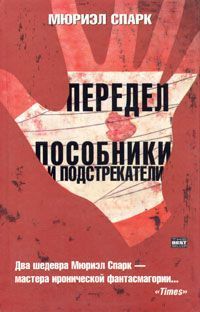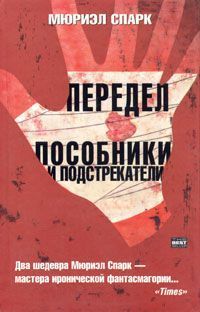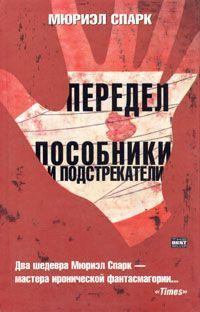Мюриэль Спарк - Английский язык с Мюриэль Спарк (рассказы)
martial ['mQ: S(q)l] upstairs ["Ap'stεqz] undoubtedly [An'dautIdlI]
There was a Herr Lublonitsch, but he was of no account, even though he got all the martial courtesies. He sat punnily with his drinking friends at one of the tables in front of the inn, greeting the guests as they passed in and out and receiving as much attention as he wanted from the waitresses. When he was sick Frau Lublonitsch took his meals with her own hands to a room upstairs set aside for his sickness. But she was undoubtedly the boss.
She worked the hired girls fourteen hours a day (она заставляла нанятых девушек работать по четырнадцать часов в день; to work — работать, трудиться, заставлятьработать, to hire — нанимать), and they did the work cheerfully (и они выполняли /свою/ работу бодро; cheerfully — весело, сготовностью). She was never heard to complain or to give an order (она никогда: «никогда не было слышно, чтобы» не жаловалась и не отдавала приказов; tohear— слышать, услышать, tocomplain— жаловаться, выражать недовольство, order— порядок, строй, приказ, распоряжение); it was enough that she was there (было достаточно того, что она была /на месте/ там). Once (однажды), when a girl dropped a tray with five mugs of soup (когда служанка: «девушка» уронила поднос с пятью чашками супа; todrop— капать, ронять, бросать), Frau Lublonitsch went and fetched a cloth (фрау Люблонич пошла и принесла тряпку; tofetch— пойти и принести, cloth— ткань, скатерть, тряпка) and submissively mopped up the mess herself (и смиренно убрала беспорядок сама; tomopup— мыть, отмывать, протирать, mess— беспорядок, грязь), like any old peasant (как любая старая крестьянка) who had suffered worse than that in her time (которая настрадалась в свое время: «перенесла что-то более плохое, чем это, в свое время»; tosuffer— страдать, претерпевать, сносить). The maids called her Frau Chef (прислуга называла ее госпожа Хозяйка: «фрау Шеф»; amaid— служанка, горничная, прислуга). "Frau Chef prepares special food («госпожа Хозяйка готовит специальную еду; toprepare— приготавливать, подготавливать, готовить) when her husband's stomach is bad (когда у ее мужа желудок не в порядке»: «плохой»; astomach— желудок, живот)," one of them told me (одна из них сказала мне).
enough [I'nAf] cloth [klOT] stomach ['stAmqk]
She worked the hired girls fourteen hours a day and they did the work cheerfully. She was never heard to complain or to give an order; it was enough that she was there. Once, when a girl dropped a tray with five mugs of soup, Frau Lublonitsch went and fetched a cloth and submissively mopped up the mess herself, like any old peasant who had suffered worse than that in her time. The maids called her Frau Chef. "Frau Chef prepares special food when her husband's stomach is bad," one of them told me.
Appended to the guest-house was a butcher's shop (прилегала к пансиону мясная лавка; a butcher — мясник, торговецмясом), and this was also a Lublonitsch possession (и она тоже принадлежала Люблонич: «и это было тоже владение Люблонич»; possession — владение, обладание, имущество, собственность). A grocer's shop had been placed beside it (бакалейная лавка располагалась рядом /с ней/; a grocer — бакалейщик, торговецбакалейнымтоваром), and on an adjacent plot of ground (и на прилегающем участке земли; plot — участокземли, делянка) — all Lublonitsch property (все собственность Люблонич) — a draper's shop was nearing completion (мануфактурная лавка была близка к завершению; a draper — торговецмануфактурой, тканями, to complete — заканчивать, завершать, укомплектовывать). Two of her sons worked in the butcher's establishment (двое из ее сыновей работали в мясном магазине; establishment — учреждение, организация, хозяйство); a third had been placed in charge of the grocer's (третий был поставлен во главе бакалейного магазина; to place in charge — заведовать, руководить, charge — нагрузка, забота, попечение, надзор); and the youngest son (и самый младший: «молодой» из братьев), now ready to take his place (уже готовый занять свое: «его» место; ready — готовый, подготовленный), was destined for the draper's (предназначался для мануфактурного магазина; to destine — назначать, предопределять).
butcher ['bVtCq] possession [pq'zeS(q)n] adjacent [q'GeIs(q)nt]
completion [kqm'pli: S(q)n]
Appended to the guest-house was a butcher's shop, and this was also a Lublonitsch possession. A grocer's shop had been placed beside it, and on an adjacent plot of ground — all Lublonitsch property — a draper's shop was nearing completion. Two of her sons worked in the butcher's establishment; a third had been placed in charge of the grocer's; and the youngest son, now ready to take his place, was destined for the draper's.
In the garden (в саду), strangely standing on a path (необычно располагаясь: «странно стоя» на тропинке) between the flowers for decorating the guests' tables (между цветами для украшения столов для гостей; to decorate — украшать, декорировать) and the vegetables for eating (и овощами для еды; to eat — есть, кушать), facing the prolific orchard (обращенная к плодоносному фруктовому саду; to face — находитьсялицомк, бытьобращеннымк, face — лицо, физиономия) and overhung by the chestnut trees (и почти что закрытая нависающими каштанами: «каштановыми деревьями»; to overhang — выступатьнад, свешиваться, нависать) that provided a roof for outdoor diners (которые обеспечивали крышу для обедающих на свежем воздухе; to provide — обеспечивать, предоставлять; outdoor — находящийсявнедома, наулице, diner — обедающий, приглашенныйкобеду), grew one useless thing (росла одна бесполезная вещь; to grow — расти, произрастать) — a small, well-tended palm tree (маленькая, ухоженная пальма). It gave an air to the place (она придавала /особую/ атмосферу всему месту). Small as it was (хотя она и была маленькой), this alien plant (это иноземное растение; alien — чужестранный, чужой) stood as high as the distant mountain peaks (казалось таким же высоким, как и пики гор вдалеке: «стояло так высоко, как и отдаленные горные пики»; distant — отдаленный, удаленный, дальний, a peak — пик, вершина, высшаяточка) when seen from the perspective of the great back porch (если смотреть: «когда на нее смотрели» с перспективы большой задней веранды) where we dined (где мы обедали; to dine — обедать, угощатьобедом). It quietly dominated the view (она спокойно доминировала в пейзаже; to dominate — доминировать, господствовать, возвышаться, a view — вид, пейзаж, панорама, взгляд).
orchard ['O: Cqd] diner ['daInq] alien ['eIlIqn]
In the garden, strangely standing on a path between the flowers for decorating the guests' tables and the vegetables for eating, facing the prolific orchard and overhung by the chestnut trees that provided a roof for outdoor diners, grew one useless thing — a small, well-tended palm tree. It gave an air to the place. Small as it was, this alien plant stood as high as the distant mountain peaks when seen from the perspective of the great back porch where we dined. It quietly dominated the view.
Ordinarily, I got up at seven (обычно я вставала в семь /часов утра/; to get up — вставать, подниматься), but one morning I woke at half past five (но в одно утро я проснулась в половине шестого; to wake — просыпаться, будить) and came down from my room on the second floor to the yard (и спустилась из своей комнаты на третьем этаже в сад; to come down — спускаться), to find someone to make me some coffee (чтобы найти кого-нибудь, /кто мог бы/ сделать мне кофе; to make coffee — приготовить, сваритькофе). Standing in the sunlight (стоя /освещенная/ солнечным светом; sun (солнце) + light (свет)), with her back to me (спиной ко мне), was Frau Lublonitsch (/была/ фрау Люблонич). She was regarding her wide kitchen garden (она внимательно оглядывала /свой: «ее»/ огромный: «широкий» огород; kitchen (кухня) + garden (сад)), her fields beyond it (свои поля, /лежащие/ за ним), her outbuildings (свои надворные постройки; building — строение, здание) and her pigsties (и свои свинарники; pig — свинья, кабан, боров) where two aged women were already at work (где две пожилые женщины уже были за работой; aged — старый, престарелый, ввозрасте). One of the sons emerged from an outbuilding (один из сыновей появился из /одной из/ построек; to emerge — появляться, показываться, выходить) carrying several strings of long sausages (неся несколько связок длинных колбас; to carry — нести, вести, sausage — колбаса, сосиска).
yard [jQ: d] beyond [bI'jOnd] emerge [I'mq: G]
Ordinarily, I got up at seven, but one morning I woke at half past five and came down from my room on the second floor to the yard, to find someone to make me some coffee. Standing in the sunlight, with her back to me, was Frau Lublonitsch. She was regarding her wide kitchen garden, her fields beyond it, her outbuildings and her pigsties where two aged women were already at work. One of the sons emerged from an outbuilding carrying several strings of long sausages.
Another led a bullock (другой /сын/ вел бычка; to lead — вести, показыватьпуть, руководить) with a bag tied over its head (с мешком /привязанным/ на голове; to tie — связывать, завязывать) to a tree and chained it there (к дереву, и привязал его цепью там; to chain — скреплятьцепью, приковывать) to await the slaughterers (в ожидании мясника; to await — ждать, дожидаться). Frau Lublonitsch did not move (фрау Люблонич не двигалась) but continued to survey her property (но продолжала обозревать свою собственность; to continue — продолжать, длиться, to survey — инспектировать, исследовать), her pigs (своих свиней), her pig-women (своих свинарок), her chestnut trees (свои каштановые деревья), her bean-stalks (ее плетни с фасолью; a beanstalk — стебельбобовогорастения), her sausages (свои колбасы), her sons (своих сыновей), her tall gladioli (свои гладиолусы; мн.ч. отgladiolus), and — as if she had eyes in the back of her head (как будто бы у нее были глаза на затылке; the back of the head — затылок, head — голова) — she seemed aware, too (она, казалось, осознавала также), of the good thriving guest-house behind her (/присутствие/ доходного пансиона за ее спиной; to thrive — процветать, преуспевать), and the butcher's shop (и мясную лавку), the draper's shop (и мануфактурную), and the grocer's (и бакалейную).
slaughterer ['slO: t(q)rq] aware [q'wεq] thriving ['TraIvIN]
Another led a bullock with a bag tied over its head to a tree and chained it there to await the slaughterers. Frau Lublonitsch did not move but continued to survey her property, her pigs, her pig-women, her chestnut trees, her bean-stalks, her sausages, her sons, her tallgladioli, and — as if she had eyes in the back of her head — she seemed aware, too, of the good thriving guest-house behind her, and the butcher's shop, the draper's shop, and the grocer's.




